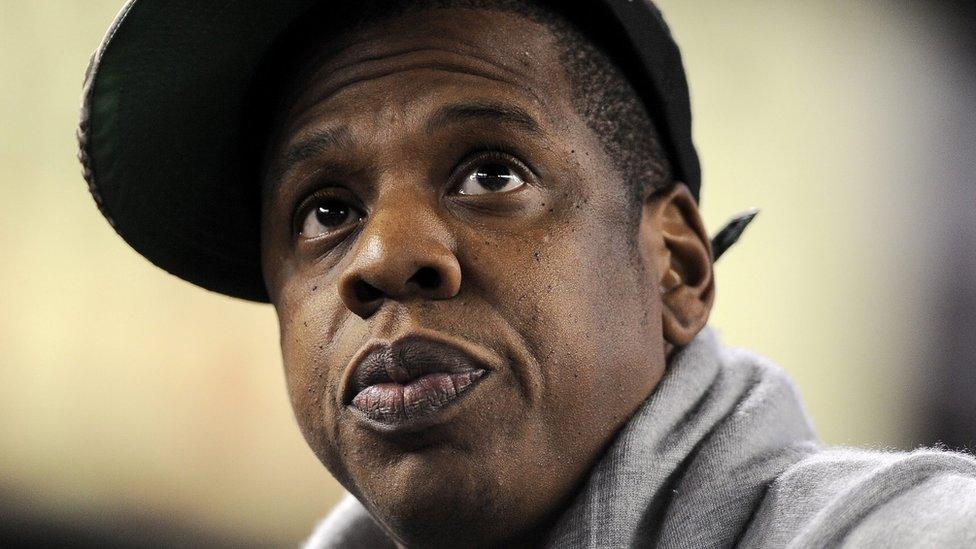Apple reveals new Music app to rival Spotify
- Published
Rory Cellan-Jones reports on how Apple is making inroads into the streaming market
Apple has announced a new app that combines a streaming song and music video library, an internet radio station and a way for artists to share unreleased tracks and other material.
It includes a recommendation system, external that uses both human curators and computer algorithms to suggest songs.
The service is set to challenge Spotify, Tidal and other music apps.
Apple also revealed that the UK will be the first country to get its Apple Pay service outside of the US.
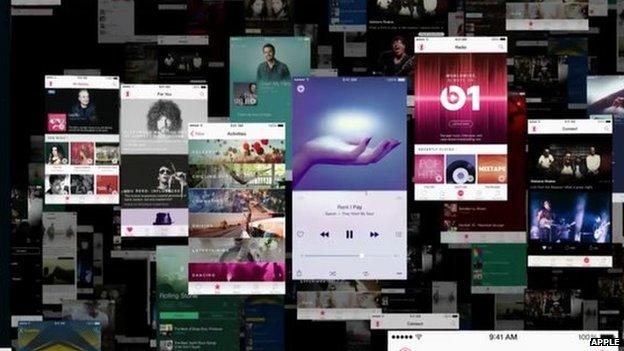
Apple's Music app will allow users to stream songs from its iTunes music library
"A lot of people in the industry see the launch of the music service as a big deal, and their hope is that this will help take subscription-based streaming mainstream," commented Chris Cooke, from the news site Complete Music Update.
"But Spotify has an ad-supported free level to help sell its premium packages, which Apple doesn't, so it still has a unique selling point."
Apple's service introduces the Beats 1 radio station, which will be hosted by ex-BBC DJ Zane Lowe among others.
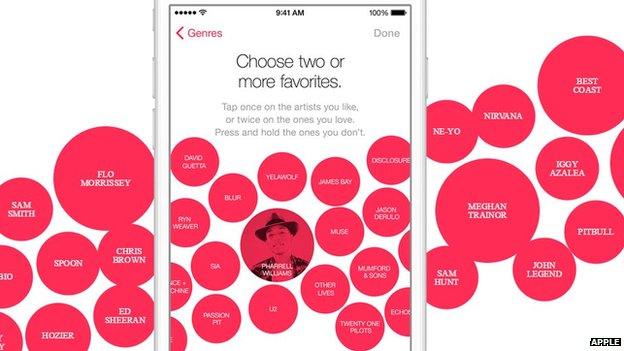
Users will be able to get personalised recommendations by telling the app who their favourite artists are
The app also works with Apple's voice-controlled virtual assistant Siri, allowing subscribers to ask it to play a song from a movie soundtrack or year without needing to know the track's name.
Recommended playlists will be crafted by "music experts" to ensure the songs fit together, but algorithms will be used to direct users to different ones based on their listening histories and favourite artists.
"Apple is arriving late to the music streaming business, due in part to Steve Jobs' refusal to believe that music subscription services would ever work," said James McQuivey from the Forrester consultancy.
But, he added, that he believed it would catch up with market leader Spotify's 15 million paying subscribers in less than a year.
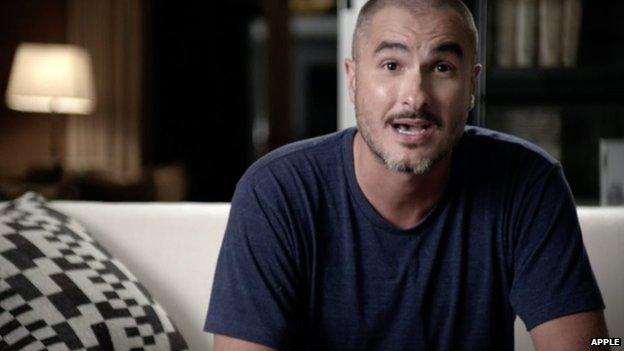
Zane Lowe will host a show on the Beats 1 radio station from Los Angeles. Its other DJs include Ebro Darden in New York and Julie Adenuga in London
Another analyst suggested Apple might face a challenge explaining all the features on offer.
"Apple Music is a complex mix of services including music streaming, live radio, music discovery and social interaction with artists," said Geoff Blaber from CCS Insight.
"It's too early to tell whether this is what users are waiting for but Apple's installed base, the three month free subscription and family bundle are huge levers that Apple's competitors will be wary of."
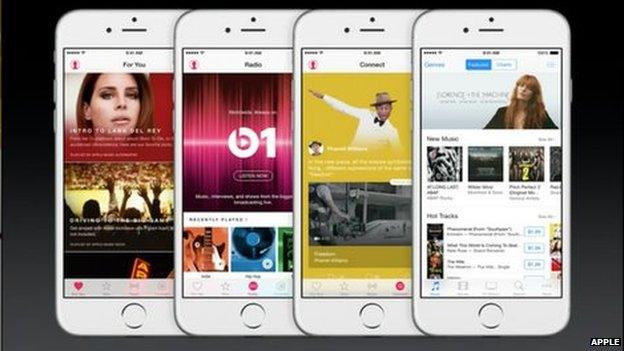
The app will allow users to stream music from iTunes' library and save tracks for offline playback
Apple said the service would launch in more than 100 countries on 30 June, and would cost $9.99 (£6.50) per month in the US for one person - the same as Spotify - or $14.99 for families containing up to six people.
Users do not need to pay to listen to Beats 1.
The Music app will initially be restricted to iOS, Windows PCs and Mac computers, but will extend to Android phones and Apple TVs later in the year.

Spotify's chief executive posted this tweet during Apple's press event - and then deleted it
Apple Pay
Apple is also seeking to expand its digital wallet scheme.
In the US, Apple Pay will add support for retailers' own payment and loyalty cards.
And in the UK, people will be able to make payments by waving their iPhones or Apple Watches at contactless payment terminals from next month.
The firm said the service would be offered at about 250,000 locations across the UK and would cover 70% of issued credit and debit cards.
Take-up of Apple Pay has been limited since it launched in the US in October.
A survey by the Reuters news agency recently indicated that less than a quarter of the US's leading retailers accepted the facility.
That is partly because Wal-Mart and 18 other stores have teamed up to launch a rival scheme, and they have agreed not to support Apple's facility until 2016 at the earliest.
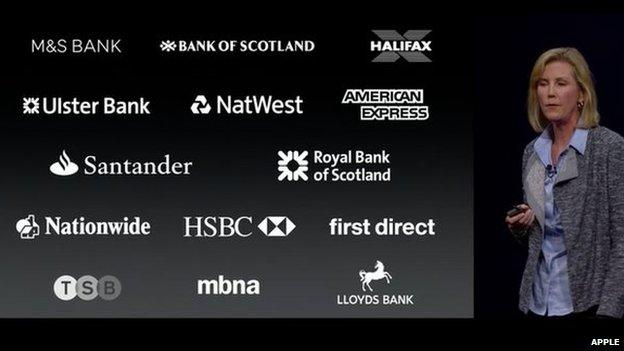
Apple said that several of the UK's leading banks had agreed to support Apple Pay
One expert said that the tech firm should find it easier to attract support in the UK, where stores already used machines for their tap-and-go payment card transactions that would become compatible.
"The equipment is already out there and Visa Europe has made the necessary infrastructure changes that pave the way for an Apple Pay rollout - it just hasn't flipped the switch yet," explained Chris Green from the Davies Murphy Group consultancy.
"In the US there have been instances where retailers have been committed to specific payment handling service contracts that have prohibited them from being involved in Apple Pay as it would represent a breach of contract for them.
"In contrast in the UK there aren't those types of roadblocks."
Apple said that the pharmacy Boots, the coffee chain Costa, the supermarket Waitrose and the London transport network were among British organisations that would support Apple Pay.
Barclays Bank was a notable omission from the list of lenders committed to the service.
But Barclays has told the BBC it is in "constructive talks" with the US firm.
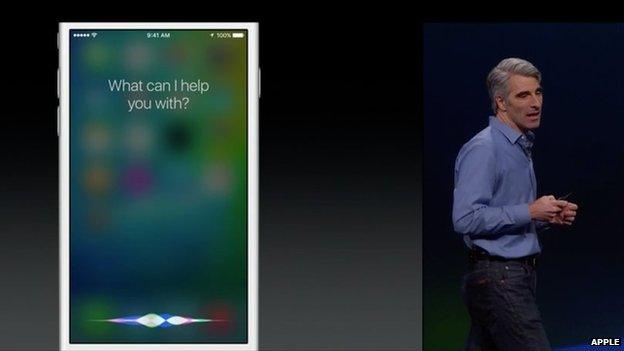
Craig Federighi showed off Siri's new user interface
Siri intelligence
Earlier during its developers conference, Apple's software chief Craig Federighi revealed that the next version of the iOS mobile operating system would give a Siri a new look and make it more "proactive".
This will include:
Suggesting appropriate music from an iPhone's lock screen if the device detects its owner is engaged in exercise
Highlighting apps it knows the user typically uses at specific times of the day
Cross referencing incoming phone calls with numbers mentioned in emails stored on the device, to tell the user who is on the line before they pick up
"We do it in a way that does not compromise your privacy - we don't mine your email, your photos or your contacts in the cloud to learn things about you," said Mr Federighi, contrasting Apple's approach with Google's Android.
"We honestly just don't want to know."
He also announced iPads would gain "multitasking" in iOS9, allowing two apps to be run side-by-side.
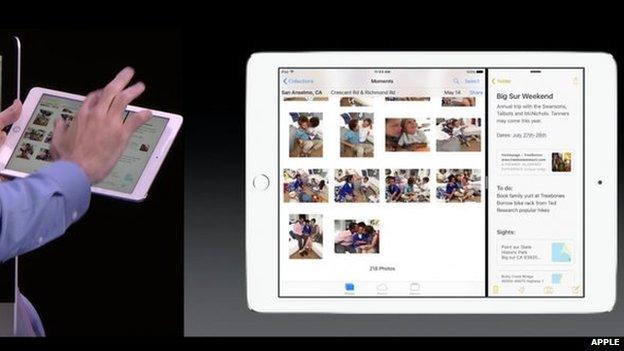
Apple's iPads will be able to run two apps on the same screen, a feature already supported by Windows 8 tablets and some Samsung Android devices
In addition, users will be able to watch streamed video in a resizable box that can be positioned above another program.
The firm also confirmed that the next version of its Maps app would provide information about public transport in London and several other cities - something Google Maps has offered for years.
It showed off a News app that brings together a personalised selection of content from different sources to provide an experience similar to Flipboard.
And Mr Federighi raised one of the biggest applauses of the event when he revealed that Apple's Swift programming language was going open source - meaning its underlying code becomes accessible to everyone - as well as making it available to Linux-powered PCs.

Cnet's editor at large, Tim Stevens, was among those surprised by Apple's open source move
Apple Watch
Apple also announced a new version of its Watch operating system that will allow third-party apps to run on its smartwatch natively.
That should make the software launch and run more quickly, addressing a common complaint from early adopters of the wearable tech and developers alike.
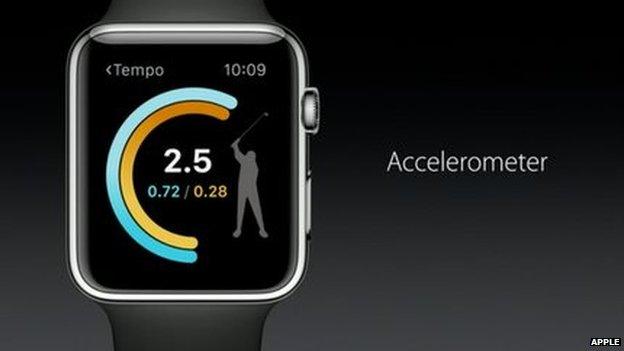
Third-party apps will gain access to the Watch's accelerometer and other sensors
"Latency is a critical success factor for any new technology, including the Apple Watch, and vital to adoption rates," commented Stephanie Uhlig from Opodo, a travel booking service that offers a Watch app.
"If service is slow, consumers will likely be inclined to rely on their existing devices. The delivery of enhancements required from Apple to improve speed and user experience will be crucial."
Third-party apps will also gain access to the Watch's motion sensors, wrist tap facility and microphone.
OS X update
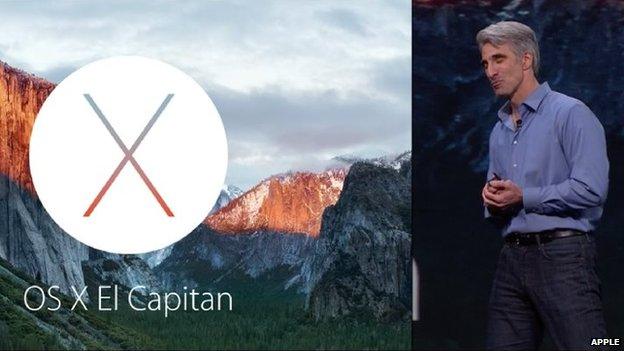
Apple's software chief revealed that the new Mac OS system would be named after Yosemite National Park's El Capitan rock formation
Mr Federighi also announced several new features that will appear in the next version of its Mac operating system, called OS X El Capitan.
They include:
Support for the firm's Metal platform, which should help its laptops and desktop computers handle more graphics intensive games
The ability to see which tabbed window in the Safari web browser is playing sound, helping users locate and mute annoying audio
Enlarging the mouse cursor if it is shaken after waking up a computer to make it easier to locate
- Published8 June 2015
- Published9 June 2015
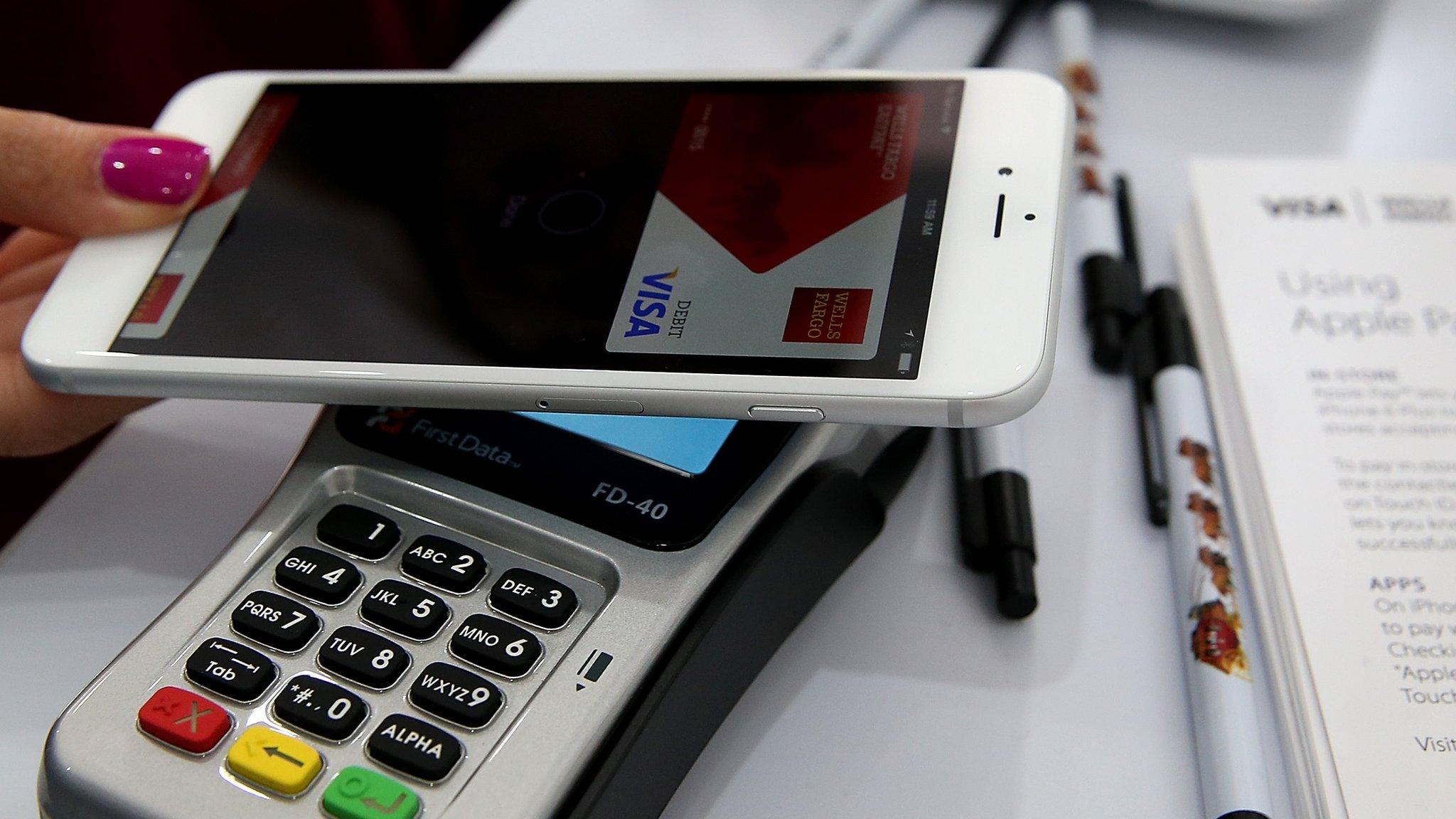
- Published8 June 2015
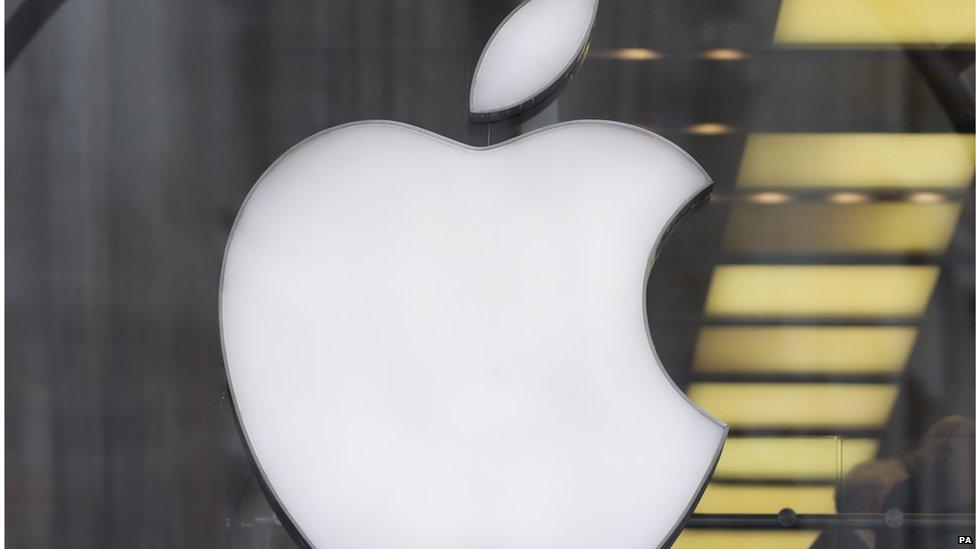
- Published28 May 2015
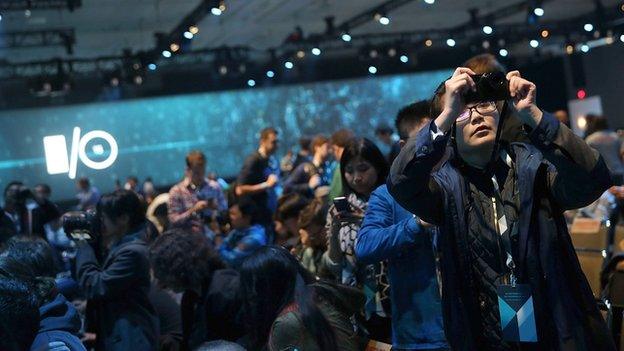
- Published20 May 2015
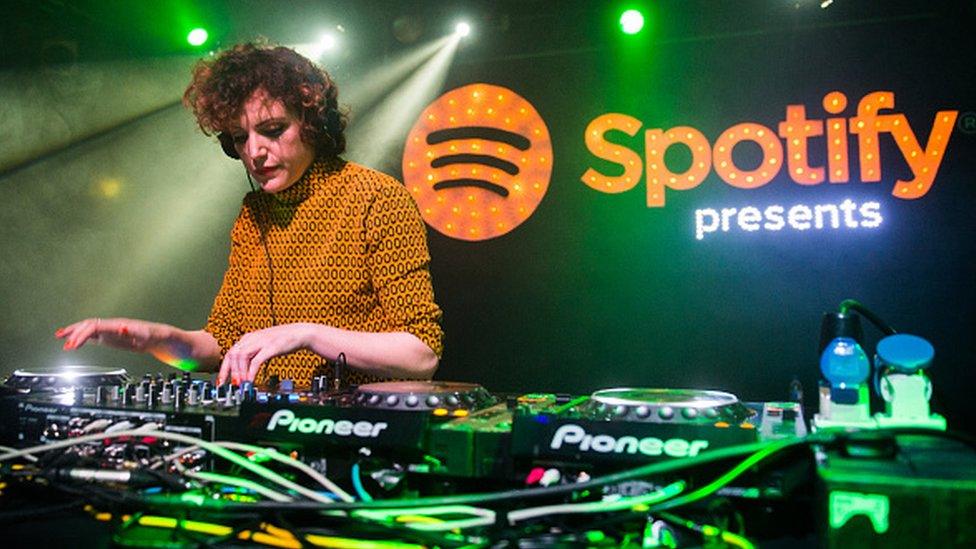
- Published26 April 2015
